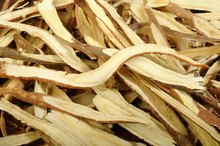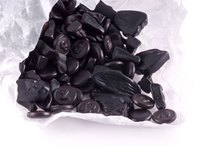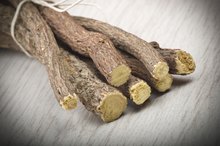What does fact checked mean?
At Healthfully, we strive to deliver objective content that is accurate and up-to-date. Our team periodically reviews articles in order to ensure content quality. The sources cited below consist of evidence from peer-reviewed journals, prominent medical organizations, academic associations, and government data.
The information contained on this site is for informational purposes only, and should not be used as a substitute for the advice of a professional health care provider. Please check with the appropriate physician regarding health questions and concerns. Although we strive to deliver accurate and up-to-date information, no guarantee to that effect is made.
Side Effects of Licorice While Breastfeeding
Many new moms believe that herbal extracts and supplements are safe because they are derived from a plant. Licorice root has been used for medicinal and flavoring purposes for centuries; however, there are several side effects that may occur when ingesting the plant. The National Institute of Health recommends avoiding the use of licorice during breastfeeding due to insufficient research and evidence. Consult your physician before taking any type of herbal supplement while pregnant or nursing.
If you are experiencing serious medical symptoms, seek emergency treatment immediately.
Licorice Root
Licorice is a plant used to flavor foods and beverages. The root of the licorice plant is used in medicine and herbal supplements 1. The root is often called "sweet root" because it contains a chemical compound that is approximately 50 times sweeter than table sugar. Licorice root has been used as an herbal remedy for a variety of health problems, including sore throat, heartburn, osteoarthritis, liver problems, muscle cramps, ulcers and infertility. More research is necessary to determine the effectiveness of the root on these health problems.
- Licorice is a plant used to flavor foods and beverages.
- The root is often called "sweet root" because it contains a chemical compound that is approximately 50 times sweeter than table sugar.
Side Effects
Dandelion & Breastfeeding
Learn More
Although little is known about the effects of consuming licorice extracts or supplements while breastfeeding, nursing mothers should avoid the plant. Consuming the plant may cause various side effects, including headaches, high blood pressure, heart disease or swelling due to water retention. Licorice root may also worsen some health conditions and should be avoided if you suffer from heart failure, diabetes, kidney disease, liver disease or low potassium levels. Women who are pregnant should avoid ingesting licorice as it may cause miscarriage or preterm labor.
- Although little is known about the effects of consuming licorice extracts or supplements while breastfeeding, nursing mothers should avoid the plant.
- Licorice root may also worsen some health conditions and should be avoided if you suffer from heart failure, diabetes, kidney disease, liver disease or low potassium levels.
Licorice Candy
Although licorice candy tastes similar to the the extract, most licorice candy does not contain licorice root. Red licorice is made without any licorice, while most black licorice candies are flavored with anise instead of licorice root. The safety of consuming licorice candy while breastfeeding is unknown.
Considerations
Side Effects of Deglycyrrhizinated Licorice
Learn More
Many herbal supplements are considered safe to ingest when nursing your newborn; however, licorice is not one of them. Always discuss the possible side effects and safety concerns of herbal supplements with your healthcare provider before taking by mouth or applying topically.
Related Articles
References
- University of Maryland Medical Center; Licorice; Steven D. Ehrlich; March 2010
- NIH National Center for Complementary and Integrative Health. Licorice root. Updated December 1, 2016.
- Raveendra KR, Jayachandra, Srinivasa V, et al. An extract of glycyrrhiza glabra (GutGard)alleviates symptoms of functional dyspepsia: a randomized, double-blind, placebo-controlled study. Evidence-Based Complementary and Alternative Medicine. 2012;2012:1-9. doi:10.1155/2012/216970
- Messier C, Epifano F, Genovese S, Grenier D. Licorice and its potential beneficial effects in common oro-dental diseases. Oral Dis. 2012;18(1):32-39. doi:10.1111/j.1601-0825.2011.01842.x
- Shi Q, Hou Y, Yang Y, Bai G. Protective effects of glycyrrhizin against β2-adrenergic receptor agonist-induced receptor internalization and cell apoptosis. Biol. Pharm. Bull. 2011;34(5):609-617. doi:10.1248/bpb.34.609
- Tsao S, Yin M. Antioxidative and antiinflammatory activities of asiatic acid, glycyrrhizic Acid, and oleanolic acid in human bronchial epithelial cells. J. Agric. Food Chem. 2015;63(12):3196-3204.
- Zhao H, Zhang X, Chen X, et al. Isoliquiritigenin, a flavonoid from licorice, blocks M2 macrophage polarization in colitis-associated tumorigenesis through downregulating PGE2 and IL-6. Toxicology and Applied Pharmacology. 2014;279(3):311-321. doi:10.1016/j.taap.2014.07.001
- Nahidi F, Zare E, Mojab F, Alavi-Majd H. Effects of licorice on relief and recurrence of menopausal hot flashes. Iranian Journal of Pharmaceutical Research: IJPR. 2012;11(2):541-8.
- Hajiaghamohammadi AA, Zargar A, Oveisi S, Samimi R, Reisian S. To evaluate of the effect of adding licorice to the standard treatment regimen of helicobacter pylori. The Brazilian Journal of Infectious Diseases. 2016;20(6):534-538. doi: 10.1016/j.bjid.2016.07.015
- Irani M, Sarmadi M, Bernard F, Ebrahimi Pour GH, Shaker Bazarnov H. Leaves antimicrobial activity of Glycyrrhiza glabra L. Iranian Journal of Pharmaceutical Research: IJPR. 2010;9(4):425-8.
- Penn State Hershey Milton S. Hershey Medical Center. Licorice.
- Omar HR, Komarova I, El-Ghonemi M, et al. Licorice abuse: time to send a warning message. Therapeutic Advances in Endocrinology. 2012;3(4):125-138. doi:10.1177/2042018812454322
- Räikkönen K, Martikainen S, Pesonen A, et al. Maternal licorice consumption during pregnancy and pubertal, cognitive, and psychiatric outcomes in children. Am J Epidemiol. 2017;185(5):317-328. doi:10.1093/aje/kww172
- Consumer Reports. Food and drug interactions you need to know about. Updated November 4, 2018.
- Winchester Hospital. Library. Updated April 11, 2011.
- Consumer Reports. How to choose supplements wisely. Updated October 30, 2019.
- FDA. Black licorice: Trick or treat? Updated November 6, 2017.
Writer Bio
Adrienne Weeks spends her time as a collegiate speech instructor, fitness instructor and stay-at-home mom. She holds a master's degree in communication studies from Texas Tech University. Weeks has written about a wide variety of topics but enjoys sharing her passion about fitness, cooking and parenting.









